
Following last week’s visit to Los Angeles-based Relativity Architects, we are moving our Meet Your Next Employer series to Phoenix, Arizona this week where we meet Studio Ma.
Founded by Christiana Moss, Christopher Alt, and Dan Hoffman in 2003, the studio has developed a portfolio driven by principles of bioclimatic regenerative design, social equity, and public engagement. The firm’s attention to bioclimatic design has previously been seen in our editorial through their sustainable townhouse complex in Arizona and their receipt of a 2021 AIA Small Project Award for their Xero Studio.
Over on Archinect Jobs, the firm is currently hiring for several positions across their Phoenix office. For candidates interested in applying for a position, or anybody interested in learning more about the studio’s work, we have rounded up five educational campus projects by Studio Ma that demonstrate their design ethos.
Opened in 2015, the Lakeside Graduate Student Community provides 715 beds in units ranging from townhouses to apartments. Following a carbon and embodied energy analysis, the team concluded that two existing 1960s concrete structures on the site could be demolished, while the construction of new buildings with improved orientation and thermal envelopes would reduce carbon greenhouse gas emissions by 42% over a 10-year period while adding 300 beds.
The resulting 384,000-square-foot, $94 million project is designed to minimize its impact on the surrounding old-growth forest and to foster what the team calls a “cohesive, vibrant, and active graduate community.” Beyond its sleeping accommodation, the scheme includes a multipurpose event space, staff offices, a community living room, a kitchen, an outdoor deck, a computer room, and an exercise room.
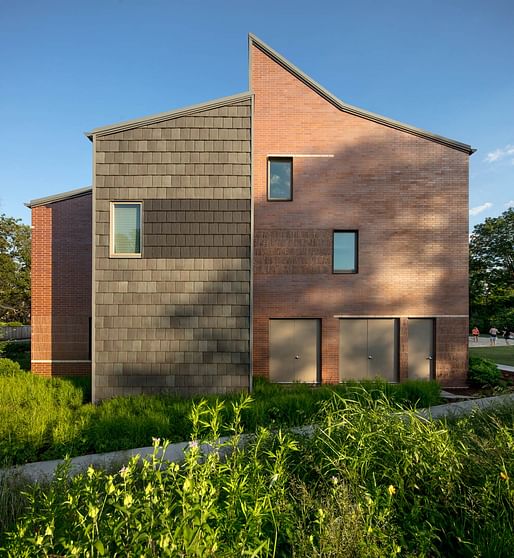
Located at the center of the Northern Arizona University campus, the Native American Cultural Center (NACC) is described as a “focal point and platform for the diverse traditions, perspectives, and contributions of Native American culture” at the campus. Designed to welcome students, scholars, tribal communities, the university community, and the general public, the center houses activities that support student recruitment and retention and serves as a point of contact for native groups on campus.
The center’s design was informed by an “Indigenous Planning Process,” which the team describes as a “value-based, participatory process invested in understanding the world view of diverse communities.” As part of the process, the designers asked focus group participants to draw and discuss symbols or themes that could be used as points of reference as the scheme’s design evolved. Four such themes were chosen for the project: Ancestors and Emergence (Spiral), Natural Flows (Rivers), Time and Place (Spiral and Sun Path), and Life Journeys (Trail of Tears).
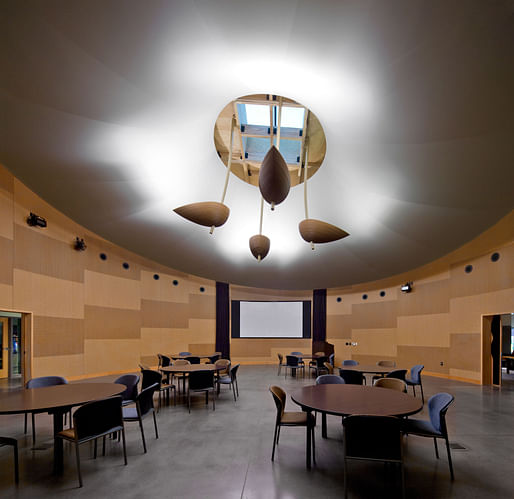
Studio Ma renovated the Campus Bookstore at ASU’s Tempe campus to add a cafe and retail display space to expand and improve the retail experience for students, faculty, and visitors. In addition to internal remodeling, the most significant intervention on the exterior of the scheme was a new storefront and shade canopy which the team used to encourage “collegial and social interaction.”
“This project faced aggressive schedule and budget challenges including the need for the bookstore to remain open during construction,” the firm explains. “Studio Ma met these challenges in innovative ways, raising the existing lobby ceiling to open the store to pedestrian traffic along Orange Way and designing a shade canopy that enables year-round use of the plaza including outdoor retail sales.”
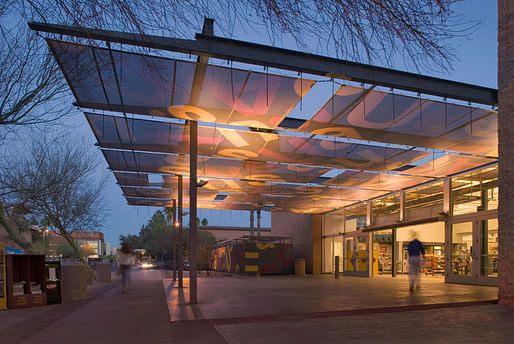
Situated between the Memorial Union and Hayden Library on ASU’s Tempe campus, the Memorial Union Plaza has historically served as a hub of student activity. In an effort to increase the quality and intensity of uses in the plaza, Studio Ma redesigned the plaza with an emphasis on areas for eating, gathering, and socializing.
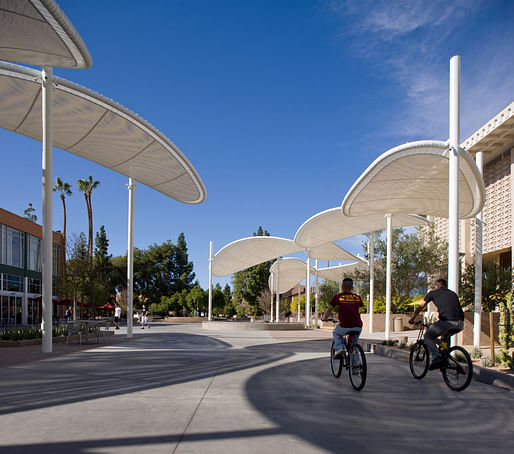
The most significant addition to the square is a collection of canopies clustered around raised planter beds. The warped elliptical form of the canopies allows for multiple spacial configurations, making room for trees and capturing pedestrian flows, while the canopies’ double-faced shade cloth surface provides “dappled shade” for students below.
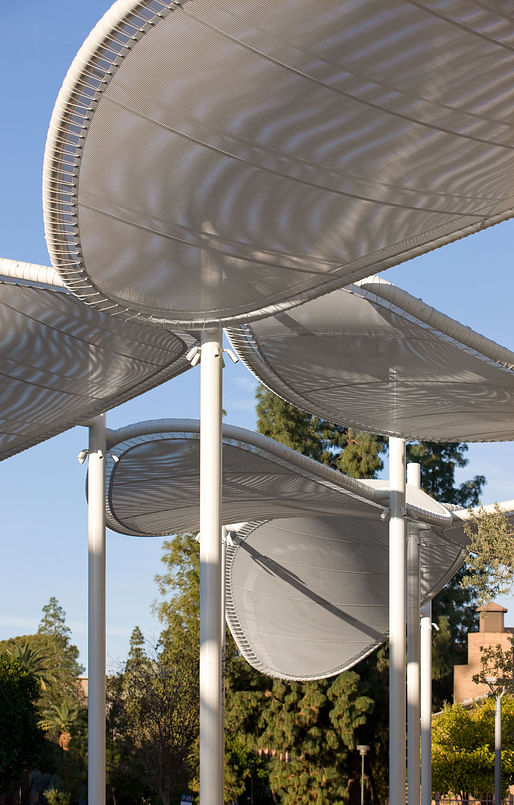
An adaptive reuse exercise on a 1967 high-rise, Studio Ma sought to revitalize the Manzanita Hall student housing tower along principles of “community, flexibility, technology, and sustainability.” The 784-bed scheme features a new exterior skin inspired by references to the manzanita tree, whose new growth creates a deep red bark to contrast its bleached-white old growth. Similarly, the old white concrete lattice structure of the existing 15-story tower was left intact while a new glass and metal skin offers a warm, vibrant contrast.
Inside, the creation of double-height “neighborhoods” with a kitchen, laundry, and study rooms links every two floors to promote student interaction. Other amenities within the tower include study areas, meeting rooms, a fitness center, and a lounge, linked to the surrounding landscape by a dynamic shade canopy.
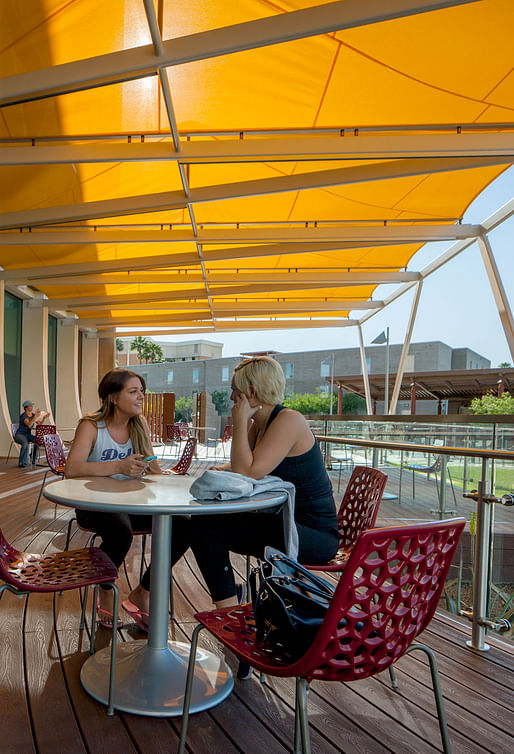
Meet Your Next Employer is one of a number of ongoing weekly series showcasing the opportunities available on our industry-leading job board. Our Job Highlights series looks at intriguing and topical employment opportunities currently available on Archinect Jobs, while our weekly roundups curate job opportunities by location, career level, and job description.
1 Comment
Such great work.
Block this user
Are you sure you want to block this user and hide all related comments throughout the site?
Archinect
This is your first comment on Archinect. Your comment will be visible once approved.